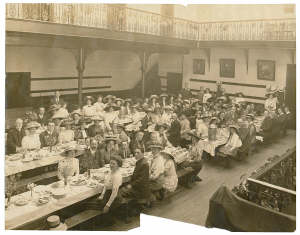The Decline of Welsh Nonconformity 2: Church Life-the Church Corporate
 Nonconformist churches were places for social interaction as well as places for worship. Every church had a Sunday-school and at least one mid-week meeting, as well as special events like the Church breakfast illustrated. Analyzing the activities of nonconformist churches, R. Tudur Jones notes that most held meetings on every day in the week, one on Anglesey had as many as 15 meetings –more than two a night!
Nonconformist churches were places for social interaction as well as places for worship. Every church had a Sunday-school and at least one mid-week meeting, as well as special events like the Church breakfast illustrated. Analyzing the activities of nonconformist churches, R. Tudur Jones notes that most held meetings on every day in the week, one on Anglesey had as many as 15 meetings –more than two a night!Many of these meetings were not religious in character but more generally social-although every chapel did have its prayer meetings. There were activities as varied as debating and sports. Although the purpose of these activities was to bring people together and deepen fellowship, it was too easy for social activities to become a distraction from the main purpose of the church. Competitions such as debating contests could engender an unhealthy spirit of competition. Independent Minister John Thomas deplored the tendency to provide amusements for young people, declaring that: ‘A Bible class in one room cannot compete with the billiard table and the bagatelle board in another room.’[2] There was every danger of churches becoming merely social centres, vulnerable to the coming of bigger and better distractions. Jones agrees, stating that often:
"[…] people began to identify Christianity with this kind of [social] activity. To such people the Christian faith was merely one facet of the Welsh-Language entertainment culture, and when a mighty tempest came to batter Welsh Christianity, they had not the strength to withstand its force."[2]
A secularised, merely cultural Christianity, devoid of devotional feeling would not retain members when the social activities that kept them in the church could be found outside it.
[1] Quoted in Jones: Congregationalism, pp.189.
[2] Jones: Faith pp.97.
Appendix: A Typical Chapel Week in Swansea (data relates to Libanus Baptist Chapel, Swansea).[3]
Monday: Prayer meeting & Temperance meeting.
Tuesday: Band of Hope & Christian Endeavour (Young People’s meetings).
Wednesday: Seiat (Fellowship and prayer meeting).
Thursday: Sisterhood Prayer meeting & Choir Practice.
Friday: Bible Class.
Saturday: Men’s Prayer Meeting.
[3] Source: R. Tudur Jones: Faith and the Crisis of a Nation: Wales 1890-1914 (Cardiff, 2004) pp.89.
Labels: Deline of Welsh Nonconformity

3 Comments:
Is that the reason why some Welsh people have claimed that "the Welsh language is the language of Heaven"?
In jest, probably.
In truth, in South Wales from the 1850s, culture became increasingly anglicised, as English-speakers from England, Ireland and within Wales. Business, work and education became increasingly English. In the Chapels, however, Welsh was still, by and large used. The result was that while English was spoken in secular areas, Welsh remained the main language for worship.
There were two negative results to this. The first was that the fate of Welsh Christianity became linked to the fate of the language. If one looks at the decline of the language, one can see the same pattern as can be seen with Nonconformity. The second was that until the 1880s, many English speakers in Wales had no contact with the Church, even if they had wanted to.
Because of the unrighteous church-state relationship known as Erastianism. A 'Free Church' is one that is not enslaved to the state.
Post a Comment
<< Home